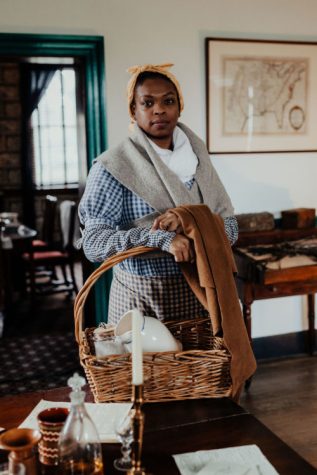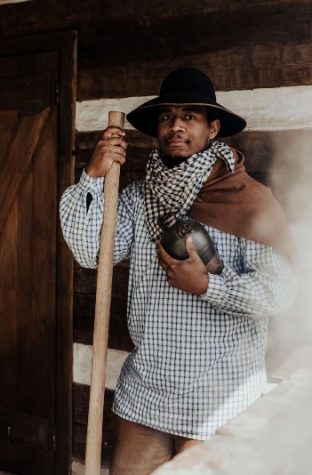Unfolding the Story: The Enslaved Community at Locust Grove
Unfolding The Story transports guests back in time to learn about the lives and stories of the enslaved community at Locust Grove. The immersive program addresses life in early Kentucky through the perspective of two members of Locust Grove’s enslaved community. Unfolding The Story is not focused on reenacting the traumatic experiences of the enslaved women, men and children who lived and worked at Locust Grove – but rather telling their stories in a way that justly depicts them as full human beings. Regularly scheduled performances are offered biweekly on Saturday from April through October. Performances occur at 10 a.m. and 12 p.m.
NOTE: Unfolding the Story takes place inside on both stories of the historic house, and in and around the other historic outbuildings on our grounds. The experience is about 90 minutes of walking and standing, sometimes on uneven ground. Locust Grove is committed to making our tours accessible to all. If you have concerns about accessibility, please call us at 502.897.9845 to discuss accommodations.
Unfolding the Story is part of the Unfiltered Truth Collection with Louisville Tourism. For questions or accommodations, please call 502.897.9845.
Meet Louisa

Louisa was an enslaved woman born c. 1809.
She had at least four children: Stephen, David, Gibson & Jesse. Charlotte Brown, later Charlotte Bishop Bransford, may have been her daughter or more likely her step-daughter. Louisa is listed on the 1849 inventory of Dr. John Croghan’s estate along with three of her children. Dr. Croghan’s will indicated that these enslaved individuals would be freed after a period of seven years.
In 1856, Louisa and her children were plaintiffs against the estate of Dr. John Croghan who sued for their emancipation and for the right to remain in Kentucky after they were freed. Our research into Louisa’s life following emancipation is ongoing.
Some pieces of Louisa’s story during Unfolding the Story represent the experiences of other enslaved women at Locust Grove, including Malinda and Chastian.
MEET ALFRED

Alfred Croghan was born sometime between 1819 and 1824. He first appears at Locust Grove as a child, “Al,” in a letter from William Croghan Jr. to his son William III written in the fall of 1828. “If you were only here now to see the dear little calves, & the lambs & little pigs – You never saw so many pigs & only to think how you would find the ducks & your eggs. Little Abe & Al, find the most & Al comes in & says “here old mister here is egg, now give me cake” & then away he runs…”
Alfred eventually came under the ownership of Dr. John Croghan who put Alfred to work at Mammoth Cave. Alfred helped with general jobs around the Cave like hauling lumber. He was responsible for blowing a horn to call the tuberculosis patients to meals, and gave us one of the best accounts of the patients there. He also served as one of the four enslaved guides at the cave along with Stephen Bishop, who was also owned by John Croghan, and Mat and Nick Bransford who were leased by John. Alfred and the other cave guides had a unique form of agency that would have been rare for an enslaved person, as the enslaved guides were in a position of authority over the guests while they were in the cave because it was important for guests to stay close to the guides.
Alfred would eventually marry a woman named Hannah and they would have at least four children together; Ellen, Charles, John, & Charlotte.
John Loraine Abbott wrote a wonderful biographical sketch of Alfred around 1854 or 1855 that gives us insight into who Alfred was as a person:
“… I was entirely satisfied with ‘Alfred’, with whom I made four different journeys through the cave, traveling under ground through various avenues more than 50 miles […] By the terms of Dr. Croghan’s will, Alfred and his wife and children will be free in about eighteen months. He is now drawing wages for his services, which, with the liberal presents he receives from visitors, will enable him to make a very fine start in the world. Alfred […] learned to read when very small; and he astonishes visitors by his use of scientific terms, and his knowledge of chemistry and geology. He has […] has visited it with a great many scientific men; has most of the standard works on geology, and is altogether an interesting character […] He was anxious to buy Uncle Tom’s Cabin, and was told that he better buy a bible. So he paid four dollars and a half for a Bible, and bought Uncle Tom, too. I can not do less than recommended all my friends who may visit the cave, to try and secure Alfred for a guide.”
It is on the walls of Mammoth Cave that we first see Alfred use the last name Croghan. Alfred and his family were part of the lawsuit against Dr. Croghan’s estate in 1856 when the enslaved people freed through graduated emancipation in Dr. Croghan’s will petitioned for the right to stay in the state of Kentucky and won their suit. Alfred moved his family to Louisville some time after he was emancipated. He died around the age of 47, ten years after gaining his freedom, in 1866. The circumstances of his death were quite tragic. He was hired to dig a pit for someone and the pit collapsed in on him. An effort was made to dig him out, but he suffocated before they could reach him.
Our research into the lives of Alfred’s wife and children is ongoing.
Support Unfolding The Story
Continued funding for the program is supported by donations made to Locust Grove’s Museum Theater Program. Help us continue this immersive learning experience by contributing to the Museum Theater Program today. Simply click the link below and specify “Museum Theater Program” on your donation form. That you for your continued support.
Past funding for Unfolding the Story has been provided by Kentucky Humanities and the National Endowment for the Humanities (NEH) as part of the American Rescue Plan Act of 2021. Any views, findings, conclusions, or recommendations expressed in this program, do not necessarily represent those of the National Endowment for the Humanities or Kentucky Humanities.